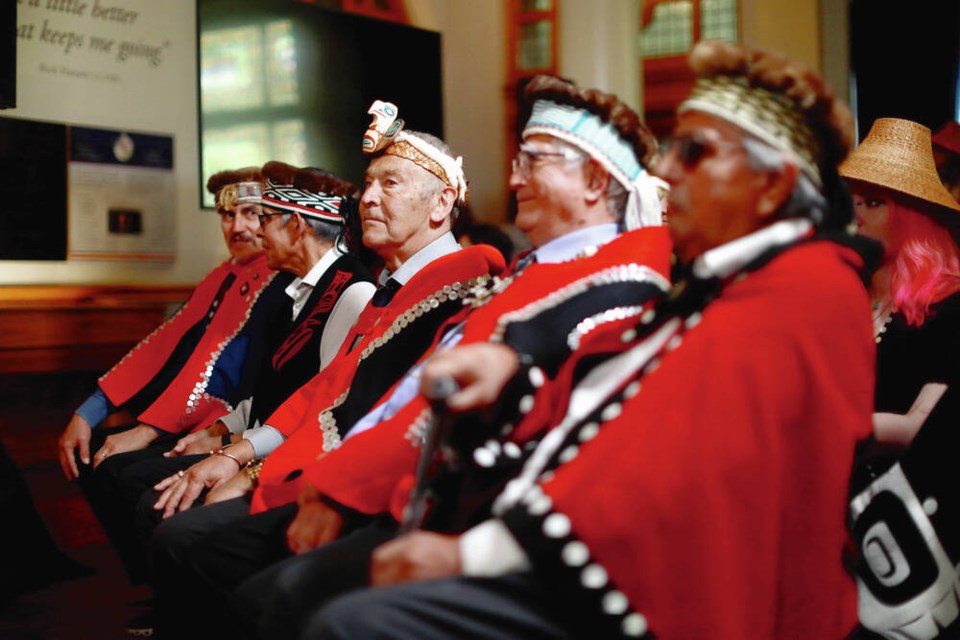It was a birth of a nation moment in the legislature this week, as regular business was parked and solemn proceedings began to essentially hand over (hand back) legal authority over Haida Gwaii to the Haida people.
You could see this coming back in 2010, when the Queen Charlotte Islands were officially renamed Haida Gwaii.
If you go by court cases, it started well before that, with a succession of decisions that urged governments to change their tune and start recognizing Indigenous claims and come to grips with the concept of Aboriginal title.
It’s a wonder some judges didn’t take part in the ceremonies Monday afternoon. They did almost as much as the Haida leaders in making the change happen.
Premier David Eby said continuing the decades-old case contesting Aboriginal title was a guaranteed losing battle.
“Everybody knew that the court case was a dud,” he said at a news conference.
The provincial government had a choice, he said. Fight some more and lose, then be forced to negotiate with the Haida, or give up and “sit down and figure it out now.”
His Haida counterpart, Gaagwiis Jason Alsop, is president of the Council of the Haida Nation, which is about to assume vastly more authority over the few thousand people on the isolated wilderness paradise, about half of whom are Haida.
The sovereign nation will “get on with figuring things out together,” he said. “It’s our home. We’re not going anywhere. Other people have the choice. They can stay or go.”
They plan to honour people’s homes and private land interests and continue peaceful coexistence.
Gaagwiis, who got a standing ovation in the legislature for his remarks, urged people not to get caught up in fear and semantics or hide behind legalities.
“Politicians in Victoria will come and go … on Haida Gwaii we’ll be there living together.”
“We have achieved something that the courts have told us to do for 40 years,” said Indigenous Relations and Reconciliation Minister Murray Rankin.
It’s the irrevocable nature of the change that will be jarring.
The magnificent mid-coast archipelago is not, in the broadest sense, “ours” anymore.
It’s “theirs.”
The centuries-old phrase “Crown land” will soon be defunct there. “The formal effect of the recognition of Haida title is that this is Haida title land,” Eby said.
“It was always Haida title lands,” said Gaagwiis.
Eby contrasted this week’s recognition of Haida title with the Supreme Court of Canada’s declaration of Tsilqhot’in title in 2014.
“That caused big, big problems on the land because… it was a very blunt instrument. It wasn’t reached at a table together in co-operation between governments …”
The Haida title is also less wrenching because it is defined simply and obviously by the stormy Pacific. There are no overlapping claims and there was no need to argue about continuous exclusive use by ancestors of every valley and beach.
Over the next several years, countless details will be negotiated, starting with how parks and protected areas will be handled, said Rankin.
Forestry claims will be next, then assorted fishing lodges. Both uses derive from provincial authority that is going to start waning.
In all the celebration and jubilation over the history-making bill, there is one critical independent view of what is happening.
A law firm specializing in Aboriginal issues, Cassells LLP, called it a “great unknown” and said the draft agreement released a month earlier creates considerable uncertainty.
It’s a contract, not a treaty, and the impact on private land could have legal consequences, despite assurances.
“The province has fashioned a version of Aboriginal title which is unknown in law…”
The firm said Aboriginal title is held communally, which restricts how it can be used. “Aboriginal title cannot coexist with a fee-simple interest (private ownership).”
So all private land owners on Haida Gwaii will need consent from the Haida Nation, regardless of the assurances they will be protected. Those assurances are “meaningless,” the firm said.
There are also independent views that support the granting of provincial title.
It’s a leap of faith and the goodwill on display this week will have to be sustained for years for it to bear out.




